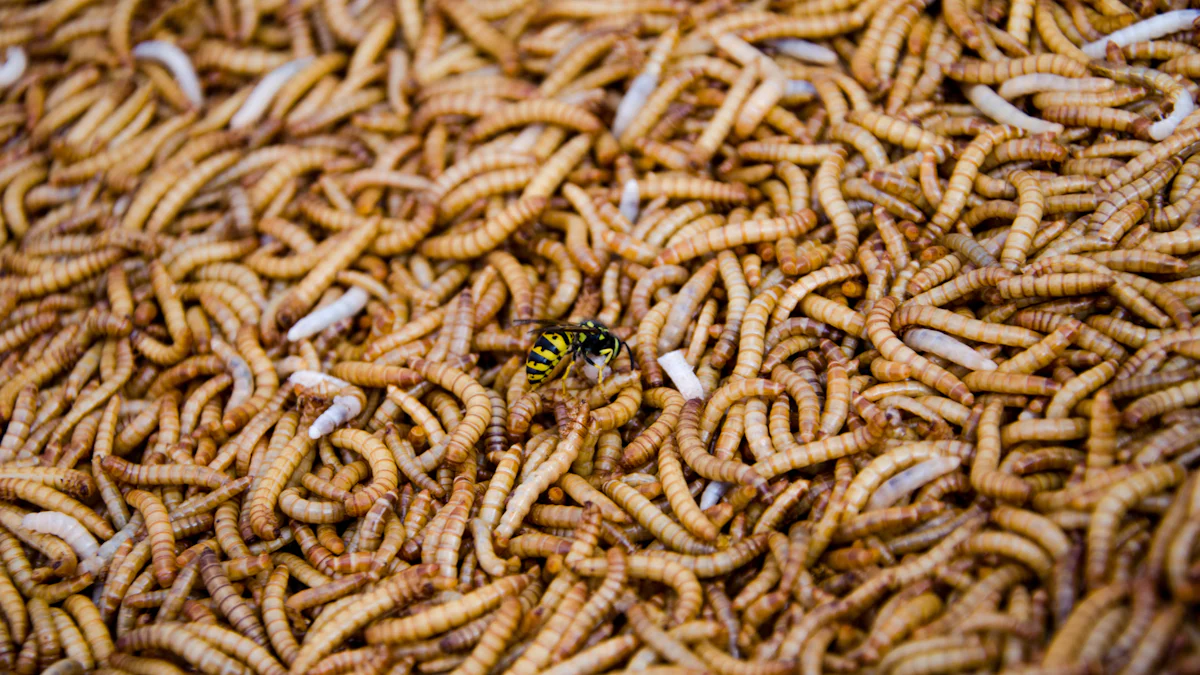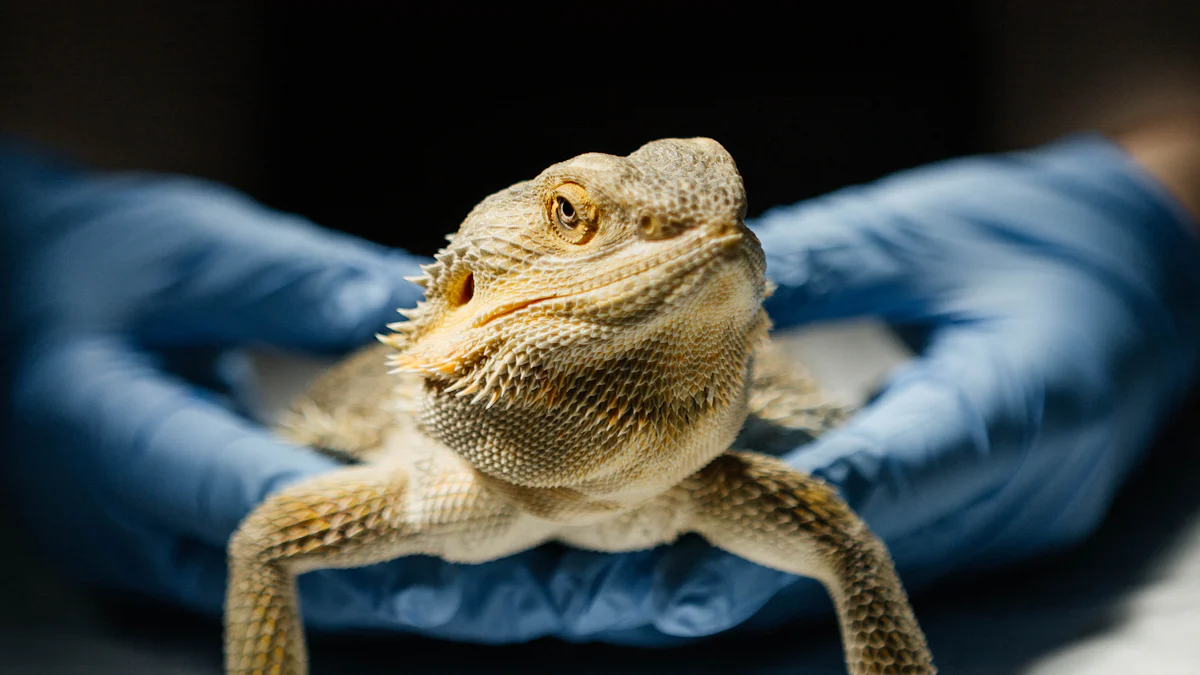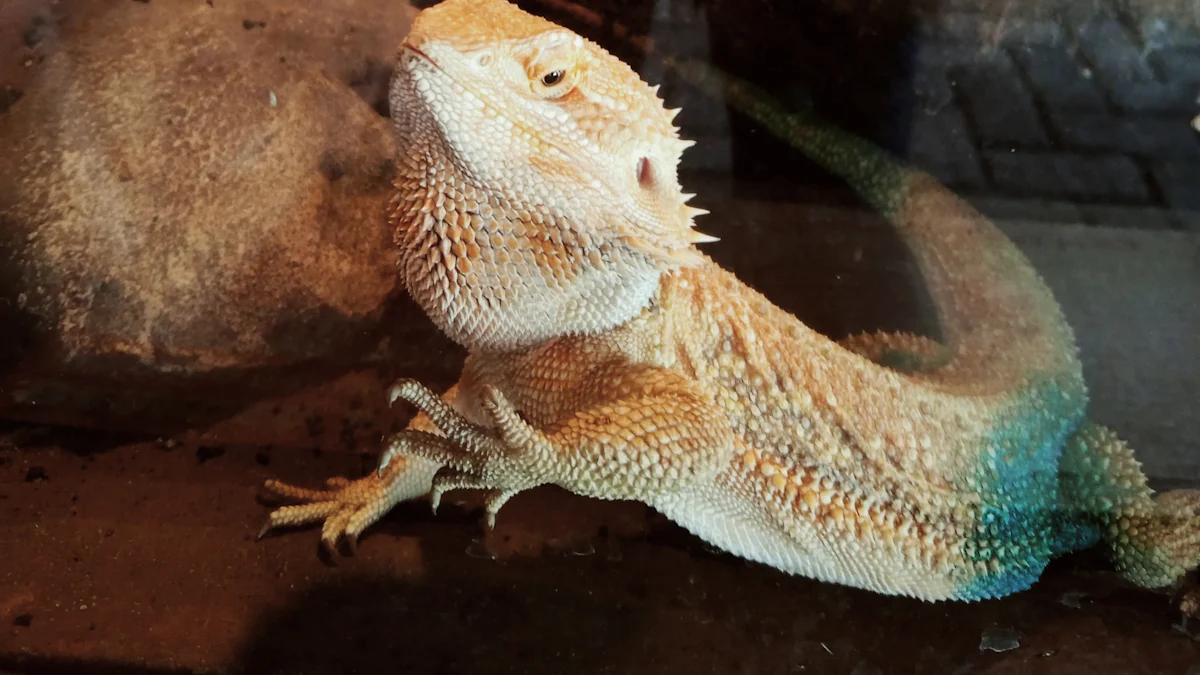
Feeding your bearded dragon safely is crucial for its health and happiness. Mealworms for bearded dragons can be a part of your pet’s diet, but you need to be careful. These little critters offer protein, which helps your dragon grow strong. However, they should not be the main course. You should mix mealworms with other insects and veggies to keep your dragon healthy. Remember, variety is key! By balancing mealworms bearded dragon with other foods, you ensure your pet gets all the nutrients it needs.
Key Takeaways
- Mealworms can be a nutritious part of your bearded dragon’s diet, but they should not be the main food source. Balance them with other insects and vegetables for optimal health.
- Gut-load mealworms with a high-calcium diet before feeding to enhance their nutritional value, ensuring your dragon receives essential vitamins and minerals.
- Feed mealworms in moderation: baby bearded dragons should have them rarely, juveniles once or twice a week, and adults two to three times a week.
- Monitor your bearded dragon for signs of digestive issues, such as constipation or lethargy, and consult a veterinarian if you notice any concerning symptoms.
- Store mealworms properly in a clean, ventilated container with a suitable substrate to keep them fresh and safe for your pet.
- Variety is key to a healthy diet; include different types of insects and leafy greens to meet all nutritional needs and keep mealtime exciting.
Nutritional Value of Mealworms for Bearded Dragons
Mealworms can be a part of your bearded dragon’s diet, but understanding their nutritional value is crucial. These little critters pack a punch when it comes to nutrients, making them a popular choice among reptile enthusiasts.
Key Nutrients
Mealworms are rich in protein, which is vital for your bearded dragon’s growth and health. Protein helps in building and repairing tissues, ensuring your pet stays strong and active. Besides protein, mealworms also contain essential fats. These fats provide energy and support various bodily functions. However, it’s important to remember that while mealworms offer these benefits, they should not be the sole source of nutrition for your dragon.
Protein and Fat Content
Mealworms boast a high protein content, comparable to some traditional meats. This makes them an excellent supplement to your dragon’s diet. However, they also contain a significant amount of fat. While fats are necessary, too much can lead to obesity and other health issues. Therefore, moderation is key when feeding mealworms to your bearded dragon.
Considerations for Bearded Dragons
While mealworms can be nutritious, there are some considerations to keep in mind. The balance of nutrients is crucial for your dragon’s well-being.
High Fat and Low Calcium Concerns
One of the main concerns with mealworms is their high fat content and low calcium levels. Bearded dragons require a diet rich in calcium to maintain healthy bones and prevent metabolic bone disease. Unfortunately, mealworms alone do not provide enough calcium. To address this, you can gut-load mealworms with a high-calcium diet before feeding them to your dragon. This process increases their nutritional value, ensuring your pet gets the necessary nutrients.
Incorporating mealworms into your bearded dragon’s diet can be beneficial, but it’s essential to balance them with other foods. A varied diet that includes different insects and vegetables will help meet all your dragon’s nutritional needs. By doing so, you ensure your pet remains healthy and happy.
Quantity and Frequency of Feeding Mealworms
Feeding mealworms to your bearded dragon requires careful consideration of both quantity and frequency. You want to ensure your pet gets the right amount of nutrients without overfeeding. Let’s break it down by age group to make it easier for you.
Guidelines by Age Group
Babies
For baby bearded dragons, mealworms should be a rare treat. Their diet should mainly consist of smaller, softer insects like crickets and a variety of greens. Mealworms have a hard exoskeleton that can be tough for babies to digest. If you choose to offer mealworms, do so sparingly and ensure they are small enough for your baby dragon to handle.
Juveniles
Juvenile bearded dragons can have mealworms more frequently than babies, but moderation remains key. You can offer mealworms once or twice a week as part of a varied diet. Make sure to balance their meals with other insects and plenty of vegetables to support their rapid growth and development.
Adults
Adult bearded dragons can enjoy mealworms more regularly, perhaps two to three times a week. However, they should not rely solely on mealworms. Adults benefit from a diet rich in variety, including other insects like dubia roaches and crickets, along with leafy greens. This approach helps maintain their health and prevents obesity.
Balancing with Other Foods
Importance of Variety
A balanced diet is crucial for your bearded dragon’s well-being. While mealworms bearded dragon can be a tasty addition, they should not dominate the menu. Mixing different types of insects and vegetables ensures your dragon receives all the necessary nutrients. Variety not only keeps your pet healthy but also makes mealtime more exciting.
Expert Testimony: Consulting with a veterinarian or other animal care professional can help ensure that your pet is receiving the appropriate amount and type of mealworms in their diet.
By following these guidelines, you can safely incorporate mealworms into your bearded dragon’s diet. Remember, moderation and variety are your best friends when it comes to feeding your scaly companion.
Method of Feeding Mealworms

Feeding mealworms to your bearded dragon involves more than just tossing them into the enclosure. You need to prepare them properly to ensure your pet gets the most nutrition possible. Let’s dive into the best methods for preparing and storing mealworms.
Preparation Techniques
Before feeding mealworms to your bearded dragon, you should consider gut-loading them. This process involves feeding the mealworms a nutritious diet before offering them to your pet. By doing this, you enhance the nutritional value of the mealworms, ensuring your dragon receives essential vitamins and minerals.
Gut-Loading and Supplementation
To gut-load mealworms effectively, place them in a separate container with a high-calcium diet, like Fluker’s High-Calcium Mealworm Diet. This product not only boosts the mealworms’ nutritional content but also serves as bedding. Make sure to gut-load the mealworms within 12 hours of feeding them to your dragon. This timing ensures that your pet benefits from the maximum nutritional value. Remember, gut-loading is crucial because feeder insects can lose nutritional value if they remain dormant for too long.
Storage and Handling
Proper storage and handling of mealworms are essential to keep them fresh and safe for your bearded dragon. Here’s how you can do it:
Keeping Mealworms Fresh
Store live mealworms in a clean, well-ventilated container. Use a substrate like bran or oats to provide a comfortable environment. Keep the container in a cool, dry place to prevent spoilage. Always handle mealworms with clean hands or utensils to avoid contamination. By following these steps, you ensure that the mealworms remain fresh and nutritious for your bearded dragon.
Incorporating mealworms into your bearded dragon’s diet can be beneficial when done correctly. By preparing and storing them properly, you provide a safe and nutritious treat for your scaly friend. Remember, mealworms bearded dragon should be part of a varied diet to keep your pet healthy and happy.
Potential Risks and Safety Precautions

Feeding mealworms to your bearded dragon can be beneficial, but it’s important to be aware of potential risks. Understanding these risks helps you take the necessary precautions to keep your pet healthy.
Digestibility and Health Concerns
Mealworms contain chitin, a tough substance found in their exoskeleton. While chitin can have positive effects on the gastrointestinal system of some animals, it poses challenges for bearded dragons.
Chitin and Overfeeding Issues
Chitin can be difficult for bearded dragons to digest. If your dragon consumes too many mealworms, the chitin can accumulate in their digestive tract. This accumulation may lead to health problems like constipation, lethargy, and loss of appetite. In severe cases, it can cause impaction, a serious condition that can be fatal if not treated promptly. To avoid these issues, offer mealworms in moderation and ensure they are part of a varied diet.
When to Seek Veterinary Advice
Keeping an eye on your bearded dragon’s health is crucial. Knowing when to seek veterinary advice can make a big difference in your pet’s well-being.
Signs of Digestive Problems
Watch for signs of digestive problems in your bearded dragon. Symptoms like constipation, lack of energy, or a decrease in appetite could indicate an issue with digestion. If you notice these signs, consult a veterinarian. They can provide guidance and treatment to help your dragon recover. Regular check-ups with a vet also ensure your pet stays healthy and happy.
By understanding the potential risks and taking safety precautions, you can safely include mealworms in your bearded dragon’s diet. Always remember to balance their meals with other foods and monitor their health closely.
Feeding mealworms to your bearded dragon can be safe and beneficial when done correctly. Remember to offer them in moderation and as part of a balanced diet. Mealworms provide essential protein, but they shouldn’t be the main food source. Mix them with other insects and vegetables to ensure your dragon gets all the nutrients it needs. By following these best practices, you help maintain your pet’s health and happiness. Always keep an eye on your dragon’s well-being and consult a vet if you notice any health issues.
FAQ
Can Bearded Dragons Eat Mealworms?
Yes, bearded dragons can eat mealworms. Mealworms are a good source of protein for adult bearded dragons. They are easy to find and care for, making them a convenient option for pet owners. However, you should feed them in moderation as part of a balanced diet.
How Many Mealworms Should I Feed My Bearded Dragon Per Day?
The number of mealworms you should feed depends on your bearded dragon’s age. For adults, a few mealworms two to three times a week is sufficient. Juveniles should have them less frequently, and babies should have them rarely. Always balance mealworms with other insects and vegetables.
How Do I Feed Mealworms to My Bearded Dragon?
To feed mealworms, place one or two on a plate or bowl in the enclosure. If your bearded dragon is older than 18 months, you can let it eat mealworms from your hand. For young dragons, use young, live mealworms as they are softer and easier to digest.
Are Mealworms Safe for Juvenile Bearded Dragons?
Mealworms can be risky for juvenile bearded dragons due to their hard exoskeleton. Young mealworms are softer and easier to digest, making them a safer choice. Avoid giant mealworms as they may cause impaction in juveniles.
What Are the Benefits of Feeding Mealworms to Bearded Dragons?
Mealworms provide essential protein, which supports growth and tissue repair. They are also easy to store and handle. Including mealworms in your dragon’s diet can add variety and nutritional value when balanced with other foods.
Can Mealworms Cause Health Issues in Bearded Dragons?
Yes, if fed in excess, mealworms can cause health issues like impaction due to their chitin content. Overfeeding can also lead to obesity. Always offer mealworms in moderation and ensure they are part of a varied diet.
Should I Consult a Vet Before Feeding Mealworms?
Consulting a vet is a good idea, especially if you’re introducing mealworms to a young bearded dragon. A vet can provide guidance on the appropriate amount and frequency, ensuring your pet’s diet remains balanced and healthy.
How Do I Store Mealworms for My Bearded Dragon?
Store live mealworms in a clean, well-ventilated container with a substrate like bran or oats. Keep them in a cool, dry place to prevent spoilage. Handle them with clean hands or utensils to avoid contamination.
Can I Gut-Load Mealworms Before Feeding Them?
Yes, gut-loading mealworms enhances their nutritional value. Feed them a high-calcium diet before offering them to your dragon. This process ensures your pet receives essential vitamins and minerals.
What Other Foods Should I Include in My Bearded Dragon’s Diet?
In addition to mealworms, include a variety of insects like crickets and dubia roaches. Leafy greens and vegetables are also important for a balanced diet. Variety ensures your bearded dragon gets all the nutrients it needs to stay healthy.


